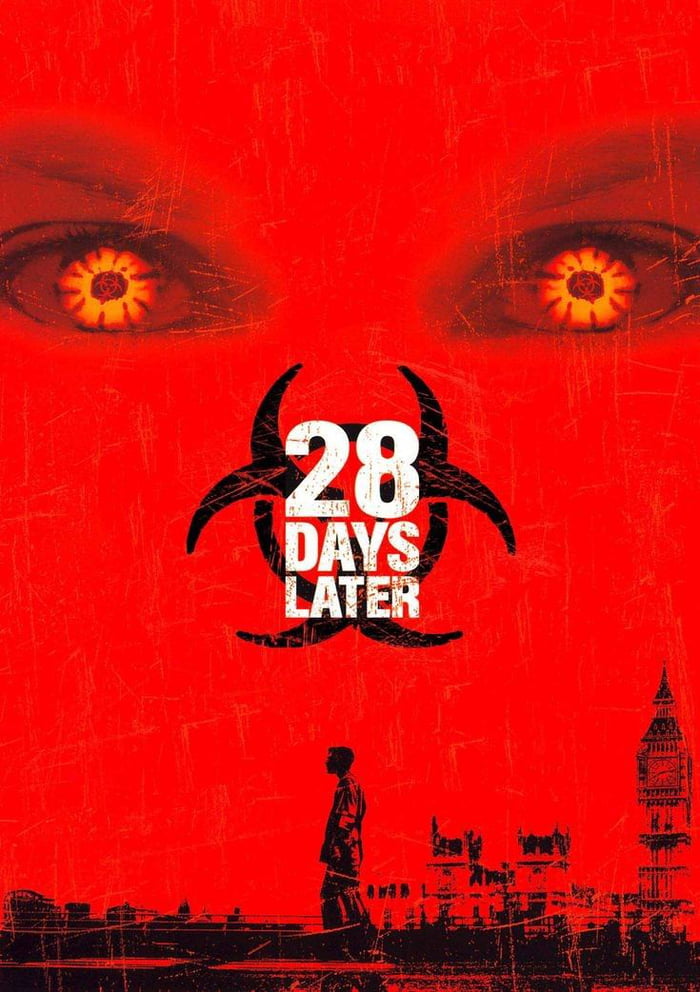Imagine waking from a coma to a world devoid of humanity, replaced by a horde of infected, rage-fueled creatures. This chilling scenario is the core of “28 Days Later,” a 2002 film that transcended the zombie genre, leaving a lasting impact on the horror landscape. Beyond its thrilling action and terrifying visuals, “28 Days Later” offers a poignant commentary on society, survival, and the fragility of civilization.

Image: 9gag.com
Released in the wake of the 9/11 attacks, “28 Days Later” resonated with audiences grappling with a sense of global vulnerability and uncertainty. Director Danny Boyle, known for his innovative work on films like “Trainspotting” and “Slumdog Millionaire,” masterfully crafted a visceral and thought-provoking experience that delved into profound themes beyond the typical zombie flick.
More Than Just a Zombie Film: The Social Commentary
“28 Days Later” goes beyond the traditional zombie trope by portraying the infected as a force of pure, unbridled rage – a relentless, animalistic threat fueled by a virus that strips away humanity. This concept is eerily prescient, reflecting a global sentiment of fear and anxiety in the post-9/11 world. The film’s stark, desolate London backdrop adds to this sense of isolation and decay, highlighting the vulnerability of even the most powerful nations when confronted with an invisible enemy.
The film also presents a scathing critique of societal breakdown and the inherent violence lurking beneath the surface of civilization. The characters, faced with the primal instinct for survival, are forced to confront their own morality. The military’s brutal response to the outbreak further exacerbates the chaos, raising questions about power, control, and the potential for even those in authority to descend into barbarity.
The Human Cost: Exploring the Aftermath of a Pandemic
“28 Days Later” goes beyond the sensationalism of a zombie apocalypse and explores the human cost of such an event. The narrative follows Jim, a man who awakens in a deserted hospital, only to find himself navigating a desolate and hostile world. His journey is not just a fight for survival, but also a quest for meaning in the face of utter chaos.
The film’s focus on Jim’s emotional journey, his struggles with guilt, fear, and isolation, provides a powerful counterpoint to the brutality of the infected. We see him grapple with the loss of his humanity, the moral compromises he makes, and the deep psychological toll of a world on the brink of collapse.
A Visual Masterpiece: The Power of Silence and Sound
“28 Days Later” is a testament to the power of visual storytelling. Boyle uses striking imagery, relying heavily on silence and controlled bursts of sound to create an atmosphere of suspense and dread. The film’s opening sequence, a silent, haunting exploration of abandoned London, is a masterclass in building tension.
The soundscape of the film is equally crucial to its impact. The eerie silence of the deserted city is punctuated by the frantic, animalistic screams of the infected and the jarring sounds of gunfire, creating a sonic landscape that is as terrifying as it is immersive.

Image: www.vrogue.co
A Legacy of Innovation: Influencing the Genre
“28 Days Later” had a significant impact on the zombie genre, introducing a new breed of infected that was faster, more aggressive, and more terrifying than traditional zombies. The film’s visual style, its focus on the psychological impact of the outbreak, and its exploration of the human condition paved the way for a new wave of zombie films that explored the genre’s darker and more realistic aspects.
From “World War Z” to “Train to Busan,” countless films have borrowed elements from “28 Days Later,” showcasing its enduring influence on the horror genre.
28 Days Later 2002 Full Movie
Beyond the Terror: A Timeless Message
“28 Days Later” is not just a thrilling horror flick. It serves as a timely and timeless reminder of the human capacity for both good and evil, highlighting the fragility of civilization and the potential for chaos to arise even in the most seemingly stable societies.
The film’s message is as relevant today as it was in 2002, reminding us of the importance of compassion, empathy, and the need for a united front in the face of a common threat.
“28 Days Later” is a film that leaves a lasting impression, a chilling glimpse into a potential dystopian future that resonates with our anxieties about the world today. It is a film that compels us to think beyond the zombies and contemplate the moral dilemmas that we face in our own lives.






